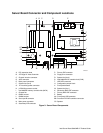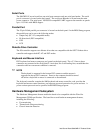20 Intel Server Board S845WD1-E Product Guide
BIOS
The S845WD1-E server board uses an Intel/AMI BIOS that is stored in the Firmware Hub (FWH)
and can be updated using a disk-based program. The FWH contains the BIOS Setup program,
POST, the PCI auto-configuration utility, and Plug and Play support.
The S845WD1-E server board supports system BIOS shadowing, allowing the BIOS to execute
from 64-bit onboard write-protected system memory.
The BIOS displays a message during POST identifying the type of BIOS and a revision code. The
initial production BIOS is identified as PT84510A.86B.
When the S845WD1-E server board’s jumper is set to configuration mode and the server is
powered-up, the BIOS compares the processor version and the microcode version in the BIOS and
reports if the two match.
PCI Auto Configuration
The BIOS can automatically configure PCI devices. PCI devices may be onboard or add-in cards.
Auto configuration lets a user insert or remove PCI cards without having to configure the system.
When a user turns on the system after adding a PCI card, the BIOS automatically configures
interrupts, the I/O space, and other system resources. Any interrupts set to Available in Setup are
considered to be available for use by the add-in card. Auto configuration information is stored in
ESCD format.
PCI IDE Support
If you select Auto in the BIOS Setup program, the BIOS automatically sets up the two
PCI IDE connectors with independent I/O channel support. The IDE interface supports hard drives
up to ATA-66/100 and recognizes any ATAPI compliant devices, including CD-ROM drives, tape
drives, and Ultra DMA drives.
The BIOS determines the capabilities of each drive and configures them to optimize capacity and
performance. To take advantage of the high capacities typically available today, hard drives are
automatically configured for Logical Block Addressing (LBA) and to PIO Mode 3 or 4, depending
on the capability of the drive. You can override the auto-configuration options by specifying
manual configuration in the BIOS Setup program.
To use ATA-66/100 features the following items are required:
• An ATA-66/100 peripheral device
• An ATA-66/100 compatible cable
• ATA-66/100 operating system device drivers
✏
NOTE
ATA-66/100 compatible cables are backward compatible with drives using
slower IDE transfer protocols. If an ATA-66/100 disk drive and a disk drive
using any other IDE transfer protocol are attached to the same cable, the
maximum transfer rate between the drives is reduced to that of the slowest
device.


















